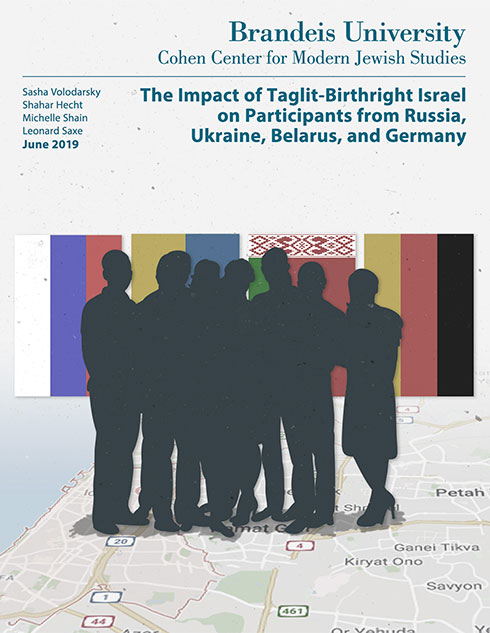The Impact of Taglit-Birthright Israel on Participants from Russia, Ukraine, Belarus and Germany
Sasha Volodarsky, Shahar Hecht, Michelle Shain and Leonard Saxe
June 2019
 This study focuses on two groups of Birthright Israel participants: first, those from Russia, Ukraine, and Belarus and second, Russian-speaking Jews (RSJ) in Germany. It is part of a larger program of research designed to understand the impact of Birthright Israel (known in the FSU and Germany as Taglit) on its participants. The study draws on pre- and post-trip surveys of the summer 2017 cohort from these countries, as well as on a long-term survey of participants from Russia and Ukraine who participated in the program during 2010-14.
This study focuses on two groups of Birthright Israel participants: first, those from Russia, Ukraine, and Belarus and second, Russian-speaking Jews (RSJ) in Germany. It is part of a larger program of research designed to understand the impact of Birthright Israel (known in the FSU and Germany as Taglit) on its participants. The study draws on pre- and post-trip surveys of the summer 2017 cohort from these countries, as well as on a long-term survey of participants from Russia and Ukraine who participated in the program during 2010-14.
Key Findings
Participants from Russia, Ukraine, and Belarus
Prior to the trip, Taglit participants from all cohorts in Russia, Ukraine and Belarus were mostly disconnected from Jewish life. Although the majority were aware of their Jewish heritage since childhood, they had few Jewish ties. About two thirds of Taglit participants had only one Jewish grandparent, more than half had no Jewish experiences growing up and more than half celebrated at least one Christian tradition as a child.
-
Taglit positively affected participants’ Jewish identity and connections. Participation in Taglit expanded participants’ social Jewish circles by increasing the number of participants’ Jewish friends. Taglit also had a substantial impact on the importance that participants placed on being Jewish and on their sense that being Jewish meant belonging to a people.
-
Taglit positively affected participants’ relationship with Israel. Participation in Taglit increased participants’ feelings of connection to Israel and their sense that being Jewish meant caring about Israel. Taglit was the initiating force behind repeat visits to Israel and immigration to Israel.
-
Participants had overwhelmingly positive impressions of the Taglit trip.
-
Taglit was the first step in a deeper, ongoing relationship with Israel. The 2017 participants felt very positive about returning to Israel, and more than one third indicated that they were actively considering moving to Israel. In the four to eight years since their trip, three quarters of 2010-14 participants from Russia and Ukraine visited Israel at least once, and 13% of participants from Russia and 25% from Ukraine lived in Israel at the time of the survey.
-
Taglit fostered long-lasting personal connections with other Jews. The bonds participants formed with others in their bus community continued months and even years after the trip.
Participants from Germany
The majority of RSJ German participants grew up having at least some exposure to Jewish life. Just over half of RSJ Taglit participants from Germany were born in the FSU and immigrate to Germany as young children; the remainder were born in Germany. Three quarters of RSJ German participants had multiple Jewish grandparents, and nearly two thirds grew up in homes where Judaism was the only religious identification. Three quarters also reported having at least one Jewish experience growing up. Forty percent had visited Israel at least once before going on Taglit.
-
Taglit had a positive impact on RSJ German participants’ relationship with Israel. The trip increased participants’ connection to Israel, their sense that being Jewish means caring about Israel, their confidence in understanding the situation in Israel and their exposure to stories about Israel on social media.
-
RSJ German participants had very positive views of the Taglit experience.
![]()